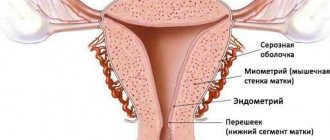When possible
The female body retains the ability to conceive until the follicle grows and develops. At this time, the uterus becomes more prepared to receive a fertilized egg due to increased hormone production.
Age-related changes are characterized by a gradual cessation of the functioning of the reproductive organs. Because of this, pregnancy during menopause in its late period is impossible.
According to official statistics, the onset of hormonal changes is recorded at the age of 45-50 years.
Complications during pregnancy after 50 years
In order to bear a child at 50 years old, you may need the help of a doctor and hormonal medications. This is due to the fact that in order to maintain pregnancy and provide the child with everything necessary, a decent amount of progesterone must be released. Up to 3 months it is secreted by the corpus luteum, as well as by the ovaries. Since at the age of 50 a woman’s hormonal function fades, progesterone may not be enough for the fertilized egg to firmly attach to the uterus and receive all the nutrients it needs.
That is why women over 50 years of age, in case of pregnancy and desire to keep the baby, are prescribed progestins. This can subsequently negatively affect the woman’s health. Often, childbirth in adulthood causes the development of cancer and problems in the functioning of the body. Women who give birth at a late age are at risk of cancer of the breast, as well as the uterus and appendages.
Janet Jackson
Possible periods
It is interesting that serious hormonal changes in women over 40 years of age largely depend on the region of residence. Age can fluctuate up to 55 years, and on average around the world this figure is significantly less than 45-48 years.
Is it possible to get pregnant during menopause? Doctors say that there are 3 different periods when conception is possible during menopause and when it is not.
1st degree
During this special period, the ovaries reduce the production of the hormone estradiol and progesterone, but the synthesis of FSH is normal, which is responsible for the active growth of follicles and the formation of estrogens, which is why it is possible to become pregnant.
The initial stage of premenopause is characterized by the following symptoms:
- menstruation becomes irregular, cycle failure occurs, and long delays occur;
- feeling of a short-term rush of blood to the face;
- excessive sweating, feeling of chills;
- regular surges in blood pressure;
- pain in muscles and joints.
As a result, it turns out that during this period, without additional contraceptive measures, pregnancy during menopause is real.
2nd degree
Menstruation has not come for a long time, and reproductive function is finally completed. The main danger for a girl is that menopause lasts more than 1 year, during which conception can occur. At this time, there are about 1000 more “live” eggs in the follicles.
Therefore, doctors do not give a complete guarantee and recommend using reliable contraception. It turns out that getting pregnant during menopause is possible.
We can talk about complete dysfunction of reproductive function when there have been no periods for 1 year or more.
3rd degree
Period 3 - postmenopause lasts from 5 to 10 years after menopause. By this time, the ovaries had significantly decreased in size. Moreover, even in the first 5 years they can release a pair of small eggs. That is, the chance of getting pregnant, although minimal, is there.
At later stages of postmenopause, follicles cease to be released even in single quantities. During this period, the complete extinction of reproductive function occurs. However, a woman's uterus can still accept an egg, but only a donor one.
During such pregnancy and menopause, a woman will have to take special hormonal medications.
At what age should menopause begin?
Depends on many factors. For example, from heredity. Therefore, it is worth asking your mother or grandmother when their menopause began and how this period proceeded. Most likely, it will be the same for you.
The state of the woman’s nervous system, previous and existing diseases, and the presence of bad habits also play a certain role.
It is considered normal if menopause begins at 45–52 years of age. However, the decline of reproductive function can begin earlier - up to 40 years. It also happens the other way around: menstruation continues even at 55 years old.
If menstruation stops before the age of 40, be sure to consult a doctor, since in the case of premature menopause, we can talk about early menopause or ovarian depletion. If no pathologies are identified, there is nothing wrong with it.
Symptoms
The first signs of pregnancy during menopause can easily be mistaken for age-related changes:
- prolonged delay of menstruation;
- a sharp change in tastes;
- attacks of nausea and vomiting;
- painful sensations in the chest, especially when touched;
- weakness, drowsiness;
- insomnia;
- aversion to strong odors;
At the same time, such signs of conception may indicate the onset of menopause.
Menopause and pregnancy: how to distinguish the two conditions?
The absence of menstruation for several months is perceived by many as the onset of menopause. But this is not the only characteristic symptom of the onset of menopause. This includes a number of conditions, united under one name “menopausal syndrome”:
- From the cardiovascular system: sudden short-term hot flashes, excessive sweating, headaches, dizziness, facial flushing, a sharp increase in blood pressure.
- Psycho-emotional disorders: sudden mood swings, unmotivated feelings of anxiety, weakening of memory and attentiveness, stress, decreased or sharp increase in appetite.
- Endocrine system. There is an increased likelihood of adrenal and thyroid dysfunction, a constant feeling of fatigue, weight gain, joint pain, itching in the vaginal area and labia.
Additionally, changes occur in the genitourinary system, which are expressed in decreased libido, vaginal dryness, pain during sexual intercourse, frequent urination, rapid appearance of wrinkles, dry skin, hair, brittle hair and nails.
Pregnancy during menopause is possible; you need to distinguish its symptoms from those of early menopause.
During pregnancy, completely different manifestations are typical:
- morning sickness (nausea, vomiting), reaction to strong odors;
- change in tastes;
- increased sensitivity of the mammary glands, their swelling;
- sudden mood swings, tearfulness;
- fatigue, daytime drowsiness, insomnia.
It is worth noting that rapid tests cannot confirm the presence of pregnancy. This is due to the fact that they react to changes in hormonal levels. In premenopause, hormone production is unstable, so this diagnostic method is not informative. Only a doctor can determine/refute pregnancy using additional diagnostic methods. You can make an appointment with a specialized specialist and get a free, competent, comprehensive consultation here https://45plus.rf/registration/.
Diagnostics
Pharmacy fertilization tests may show 2 lines when a woman has elevated levels of hCG in her body. But it is important to consider that during menopause, in a woman these indicators are often overestimated and can be as high as 15 IU/l.
This may also indicate early signs of conception. Obviously, home pregnancy tests during menopause may be inconclusive. Therefore, they should not be used during age-related changes.
In such a situation, it is better to contact a diagnostic center and undergo the necessary tests. This is necessary to confirm or deny conception. Since doctors can confidently say how to distinguish menopause from pregnancy, it is therefore recommended to visit a gynecologist.
A gynecological examination will help to confidently confirm conception, if any, and an ultrasound examination will help determine its duration.
Contraceptive methods for those over 40
Only the attending physician should select contraceptives. If before this the patient used barrier-type products (spirals, caps), then after assessing the state of health, they will continue to be used. They are not prescribed if there is dysfunction or prolapse of the pelvic organs.
Often the gynecologist prescribes oral medications. These drugs not only perform a preventive function, but also help cope with the negative consequences of menopause. They improve the patient’s well-being and have a positive effect on the skeletal and cardiovascular system. These drugs contain hormones necessary for women's health - estrogens (its synthesis by the ovaries is reduced, which negatively affects the functioning of the entire body). Hormonal drugs also prevent the development of cancer of the uterus, mammary glands, and ovaries.
Their selection is an individual task. Taking oral medications can cause vascular diseases or abnormalities in metabolic processes (if predisposed). To reduce the likelihood of disorders occurring, medications are prescribed in microdoses. Oral contraceptives should not be prescribed to women who have a long history of smoking (with a daily intake of 15 or more cigarettes). This factor increases the risk of developing cardiovascular diseases significantly.
The calendar method for determining ovulation loses its information content during this period. Cycles are disrupted, often without the maturation of the egg, so the basal temperature does not change.
When determining a contraceptive method, you cannot do without consulting a specialized specialist. First, an assessment of hormonal levels is carried out in order to choose the right composition of the product. It is imperative that an endocrinologist, cardiologist, and therapist be involved in the comprehensive collection of information.
Recommended video:
Possible complications
The main danger of late pregnancy is the following:
- Age-related diseases begin to manifest themselves to a greater extent (problems with blood pressure, diseases of the musculoskeletal system, thyroid diseases, etc.);
- exacerbation of chronic diseases or the emergence of new ones;
- diseases of the heart and blood vessels.
The older the mother and her husband are, the greater the chance of giving birth to a baby with chromosomal abnormalities. All accumulated diseases can cause a number of complications during pregnancy. They are dangerous not only for the mother, but also for the fetus.
The dangers of pregnancy during menopause
During menopause, a woman’s body undergoes changes and stress, which many experience quite hard. If pregnancy is added to this, then even more troubles arise that can be life-threatening. The danger of pregnancy after 40-45 years is as follows:
- Risk of diabetes. This endocrine disease is dangerous in itself, and during pregnancy and childbirth it can lead to irreversible processes and severe pathological conditions.
- Arterial hypertension. A sharp increase in blood pressure is a risk of stroke or heart attack, especially during childbirth.
- Exacerbation of chronic diseases. By the age of 40, diseases that were previously ignored begin to manifest themselves.
- During fetal development, the volume of substances increases, the load on the kidneys, skeleton, and pelvic organs increases. Under the influence of natural changes during menopause, serious disorders in the functioning of these organs and systems are observed.
- The risk of developing genetic abnormalities in the fetus increases, the most common of which is Down syndrome. Therefore, it is imperative to carry out screenings during pregnancy and after childbirth.
- Imperfect hormonal levels and wear and tear of the reproductive system often cause miscarriages or ectopic pregnancies.
- The loss of vitamins and minerals causes insufficient elasticity of the birth canal, so ruptures during childbirth are likely. Weakened immunity leads to infectious lesions. There is also a high infant mortality rate.
For this reason, gynecologists do not recommend planning a late pregnancy during menopause. If this happens, assessing the possible risks, the doctor will suggest artificial interruption.
Is it possible to get pregnant during menopause: ectopic location
During a normal pregnancy, a fertilized egg (zygote) is released into the uterine cavity, where it attaches to its walls. As a woman ages, pathological changes occur that interfere with the normal passage of cells. For this reason, the zygote is fixed to the fallopian tube, ovary, or penetrates the peritoneal cavity. There it develops until it leads to ruptures. The danger lies in excessive bleeding of the vessels of the tube or ovary, peritonitis. As a result, a woman can lose not only them, but her entire uterus.
Signs of an ectopic pregnancy include severe pain and bleeding. Pain may occur when changing body position or walking. Their localization depends on the place of attachment of the fertilized egg (in the side or in the middle of the abdomen). Symptoms appear on average at 8 weeks, but possibly a little earlier (5-6 weeks). In order to respond to this situation in a timely manner, you should consult a doctor in time, who, using ultrasound diagnostics, will be able to determine the basic parameters of the position.
Ectopic pregnancy during menopause in women occurs for the following reasons:
- Frequent inflammatory processes that occur on the ovaries and fallopian tubes.
- Cystitis, gynecological infectious diseases.
- Surgical interventions, including abortions.
- Age-related hormonal imbalance, which leads to narrowing of the tubes.
The formation of adhesions occurs, which do not allow the zygote to enter the uterine cavity through the remaining holes. If an ectopic location is detected in a timely manner, an operation to terminate the pregnancy is performed.
Desired childbirth and abortion
Can a woman get pregnant during menopause? Yes, this is possible, and not only theoretically. In medical practice, such cases are not uncommon. This is due to the fact that a couple stops using contraceptives if menstruation disappears for 3-4 months. This is due to low awareness of the changes occurring in the body during menopause and its main stages.
If you decide to get pregnant after 40 years of age, be sure to consult a doctor before the procedure, and also regularly visit a specialist who can monitor the condition of the mother and fetus.
Probability of fertilization during menopause
The final stage of menopause as a physiological process is postmenopause, during which a woman’s body undergoes radical hormonal changes. At this stage, the woman's ovaries stop working. However, it is worth noting that this process can last for 10 years. However, he will still be able to conceive a child.
There is even a method of artificially stimulating the ovaries, which helps to get pregnant even after menopause. Although this procedure is very effective, it has a large number of risks. In this regard, it is prohibited for patients with health problems or in cases of threat to the life of the fetus or hereditary pathologies.











